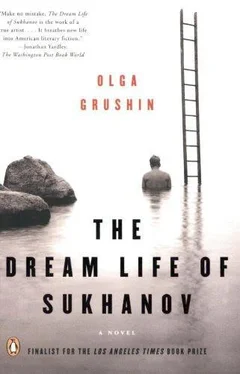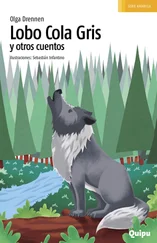He knew with perfect conviction what an unfathomable thing it would be to walk away right now, without saying another word, without attempting to restore their life to the way it had been—yet at the same time, he felt strangely unable to break out of his stupor. And deep inside his heart, he sensed that his inaction stemmed from his ultimate acceptance of unhappiness, perhaps even a kind of perverse satisfaction at the thought that an ultimate justice was being served.
For deep inside his heart, he realized that he deserved it all.
Moving Nina’s fluttering hands away, Sukhanov turned and walked through the door. The terrace steps were slippery with evening dew, and the twisting shadows of the path embroiled his shoes in dimly aromatic, faintly menacing coils of invisible rose branches. He stopped and listened briefly: she had not followed. Then, greeting his rightful fate with a quiet smile, he extricated himself from the roses, pushed open the gate—and exited into the night.
The station was in the nearby village of Bogoliubovka. A few summers ago, Sukhanov had gone there with Nina to meet some friends arriving by train. Beyond the gated cluster of well-appointed houses of the privileged, they had walked through a pleasant birch forest, rosy in the light of the morning sun, and on the way through the village, Nina had surreptitiously picked moist, sweet raspberries off bushes spilling over low fences—altogether an effortless little stroll through the Russian countryside in the comfortably familiar, occasionally maudlin style of Levitan.
Now, in the dark, the terrain seemed dramatically altered. The ordinarily smooth road tripped him with devious potholes; ghostly dogs strained on their chains behind his back, growling rabidly at his trespass; fat, furry moths beat a repulsively soft, flickering rhythm against streetlamps; and many-armed, troll-like silhouettes shifted feverishly in the lit windows of neighboring dachas, engaged in some dim, ugly activities of living. He passed through it all, indifferent to the strangeness of the world. But when the last of the imposing houses melted away in the wavering circle of the last streetlamp, and a watchman—a mere contour carelessly sketched by the night around the glowing pinpoint of a cigarette-pushed the gates closed behind Sukhanov’s back, he was startled to see the path ahead of him swallowed by the black mass of the forest.
He hesitated before stepping under the trees.
The night was deeper here, the silence complete, the air musty with pungent smells of dampened moss and sweetly rotting leaves and poisonous mushrooms. He moved cautiously, barely able to see the ground beneath his feet. After a while, he felt the first twinge of worry. From his past walk, he had preserved an impression of this wood being transitory, nearly transparent, with dazzling splashes of clearings visible almost immediately between the birches—yet now, with every passing moment, the trees seemed to draw closer and closer together, crowding him with their motionless presence, and the infinite silence tolled in his aching head like a giant bell. He quickened his pace, and still the forest went on; and as he entered farther into its breathless darkness, he imagined it altering slowly, growing more menacing and strange with each new step. Gradually his eyes began to distinguish murky, twisted shapes, whether dead stumps and gnarled branches or some clumsy, frightening creatures of the earth, creeping after him along the ground or leaning above him from the trunks; and after some time, the profound quiet of the place filled with a multitude of insidious, secret sounds—a rustling shudder of leaves, starting unexpectedly, without wind, and falling still just as incomprehensibly; the hollow moan of an insomniac bird or else a dispossessed spirit; the sharp creak of a twig snapping under a mysterious foot… And all at once he knew that the sunlit birch grove of his summery recollection had long given way to the oppressive, cathedral-like woods of his recent nightmare, and he felt weak with the fear of wandering off his obscure path and becoming forever lost in a suffocating, torturous labyrinth of evil dreams.
He walked faster and faster, until he was running, hurtling headfirst through the chilly blackness, heedless of roots and ghosts. His middle-aged heart pounded painfully, and his mild but persistent inebriation tangled his feet. When the trees finally started to part, revealing pale flashes of the night sky between them, his knees were about to dissolve in trembling aches, and his right shoulder was numb from the weight of his bag. Once in the open, he paused to catch his breath—and as he waited, he became aware of the unfamiliar landscape before him. He had expected to see the lights of Bogoliubovka just beyond the forest, but instead, a wide meadow swayed in the blue light of a dying moon. Shouldering his bag once again, he waded across the expanse, at first simply glad to have outrun his nightmare, then increasingly uneasy. Tall grasses brushed against his legs, heavy and moist; the unseen earth yielded softly under his feet; stars rolled down the skies like drops of rain; and fog rose in uneven patches off the ground and drifted past him in an eerie procession of limbless, faceless spirits.
There was no village in sight.
His steps grew hesitant then, his thoughts wary. The meadow descended into a steep ravine, overgrown with wild hazel trees; on the way down, he stumbled and smashed his knee against a shadow of a rock. Suspecting now that he must have taken a wrong turn somewhere in the woods, he remained still for a long while, nursing his wound and watching the remote skies. But when he groped his way to the other side, he found himself presented with the gift of a solitary streetlamp on a distant hillside, spilling rarefied purple light onto an indistinct building that could only be the Bogoliubovka train station.
He limped toward it—and the anticipated station slowly underwent a shimmering, disorienting transformation, shrinking in length and growing in height, until it condensed before his eyes first into the Kremlin’s Spasskaya Tower (what nonsense, he thought tiredly), then into a vanquished fairy-tale monster (Sukhanov blinked), and finally into a small church. He went closer, half awaiting another metamorphosis. The church was a pitiful ruin, with four of its domes beheaded and the fifth, central, one bereft of its cross and sagging around a shadowy gash, the whole edifice falling into the paling abyss of the peasant night. He regarded it morosely, no longer doubting that he was lost—the place was entirely new to him. Then, noticing a weed-choked path climbing past the church into the darkness, he rubbed his smarting knee and listlessly walked along it.
When he neared the ruin, the sparse, cold light of the streetlamp seeping through a yawning portal granted him a glimpse of a bare interior—the floor buried under decades of rubble, bulky shapes of sundry bales stacked high in the corners, years of indifference and misuse… Suddenly a puzzling flash of green alighted on the periphery of his vision. Surprised, he stopped and peered into the moldy dimness, waiting for his eyes to adjust. And then he saw the walls. Brittle under the weight of centuries, darkened by numberless summers of rains, faded by numberless winters of snows, the walls of the church were covered with frescoes.
After a moment’s hesitation, he set his bag down and gingerly stepped inside. The heavens leaked starlight through the many tears in the roof, and in the wreckage of the solitary dome, wings of invisible sleeping birds rustled. The air had a heavy smell of age and oblivion, with a sour undercurrent of bird droppings, and with every halting step he made, he crushed underfoot rotting wood and damp plaster—and possibly, he thought with a start, priceless masterpieces of disintegrating medieval art.
Читать дальше








![Theresa Cheung - The Dream Dictionary from A to Z [Revised edition] - The Ultimate A–Z to Interpret the Secrets of Your Dreams](/books/692092/theresa-cheung-the-dream-dictionary-from-a-to-z-r-thumb.webp)



